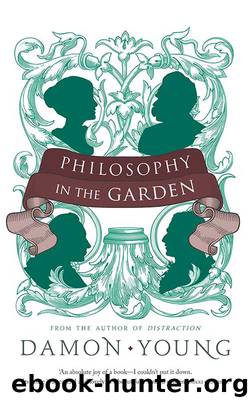Philosophy In the Garden by Damon Young

Author:Damon Young
Language: eng
Format: epub
Publisher: Melbourne University Publishing
Published: 2012-10-15T16:00:00+00:00
Jean-Jacques Rousseau: Botanical Confessions
I am convinced that at any age the study of nature … bestows upon the mind a salutary nourishment by filling it with a subject most worthy of its contemplation.
Jean-Jacques Rousseau, letter to Madame Étienne Delessert, 1771
Philosopher Jean-Jacques Rousseau’s greatest talent was not logic, morality or metaphysics. It was self-portraiture. Rousseau’s literary works left a striking sketch of the author: a new kind of eighteenth-century Frenchman, brave, sincere and just. This was idealised, of course. ‘My innate goodwill towards my fellow men; my burning love for the great, the true, the beautiful’, he boasted in his Confessions, ‘my inability to hate, to hurt, or even to want to’. In the sentimental spirit of the age, and with more than a little conceit, Rousseau spared no superlatives when describing his own virtues.
Rousseau’s literary persona inspired the rich patrons, like the Duke and Duchess Montmorency-Luxembourg, who housed, fed, clothed and defended him (the duchess hoped to one day ‘merit a tiny part’ of Rousseau’s friendship). It also inspired the leaders of the French Revolution, who hailed Rousseau as a modern martyr for truth. The Scottish philosopher Thomas Carlyle once quipped that the second edition of Rousseau’s The Social Contract was bound in the hides of those who mocked the first. In fact, the bourgeois revolutionaries often ignored The Social Contract, but Rousseau’s autobiographical and fictional works—like Confessions and Julie: Or, a New Heloise—kept his portrait alive and loved. If France under the Ancien Régime was corrupt, false and selfish, this Rousseau was upright, honest and altruistic. ‘Divine man’, said Revolutionary leader Maximilien Robespierre, ‘I have contemplated your august traits. I have understood all the sorrows of a noble life devoted to the cultivation of truth’.
But all of Rousseau’s virtues, genuine and counterfeit, were prefaced by his gifts with the pen. Rousseau the author invented Rousseau the saint—and did it with boldness, lyricism and canny intelligence. When he won the Dijon Academy’s prize for his essay on arts and sciences in 1750, the author’s arguments—lambasting the degeneracy and weakness of intellectual life—were by no means original. Roman satirists had made the same arguments over a millennium earlier. What made the essay so striking was Rousseau’s prose—what his biographer JH Huizinga described as ‘the hyperbole, the defiant, not to say offensive, tone’. It gave him entry into the highest Parisian salons, his ferocity and righteousness lauded by the very aristocrats he was railing against. Rousseau had a talent, he wrote quite rightly in his Confessions, ‘for telling useful but unwelcome truths with some vigour and courage’.
Raptures and Ecstasies
But for long spells, writing was not this best-selling author’s passion. The autumn of 1765 finds Rousseau not at his study, pen in hand, but on his belly in the woods of Saint-Pierre, an island on Switzerland’s Lake Bienne. Here, Rousseau was in exile.
His Emile: or on Education was published three years before, and greeted with condemnation and censure by Roman Catholic and Protestant authorities alike. His offence was to put heretical ideas—disbelief in
Download
This site does not store any files on its server. We only index and link to content provided by other sites. Please contact the content providers to delete copyright contents if any and email us, we'll remove relevant links or contents immediately.
The remains of the day by Kazuo Ishiguro(7543)
Tools of Titans by Timothy Ferriss(6938)
The Black Swan by Nassim Nicholas Taleb(6184)
Inner Engineering: A Yogi's Guide to Joy by Sadhguru(5888)
Giovanni's Room by James Baldwin(5873)
The Way of Zen by Alan W. Watts(5790)
The Six Wives Of Henry VIII (WOMEN IN HISTORY) by Fraser Antonia(4785)
The Power of Now: A Guide to Spiritual Enlightenment by Eckhart Tolle(4749)
Astrophysics for People in a Hurry by Neil DeGrasse Tyson(4614)
Asking the Right Questions: A Guide to Critical Thinking by M. Neil Browne & Stuart M. Keeley(4567)
12 Rules for Life by Jordan B. Peterson(3724)
The Ethical Slut by Janet W. Hardy(3494)
Skin in the Game by Nassim Nicholas Taleb(3456)
Housekeeping by Marilynne Robinson(3397)
The Art of Happiness by The Dalai Lama(3378)
Double Down (Diary of a Wimpy Kid Book 11) by Jeff Kinney(3267)
Skin in the Game: Hidden Asymmetries in Daily Life by Nassim Nicholas Taleb(3259)
Walking by Henry David Thoreau(3228)
12 Rules for Life: An Antidote to Chaos by Jordan B. Peterson(3196)
